人教版必修1 unit4 P5 Listening exercise
- 格式:ppt
- 大小:1.20 MB
- 文档页数:22
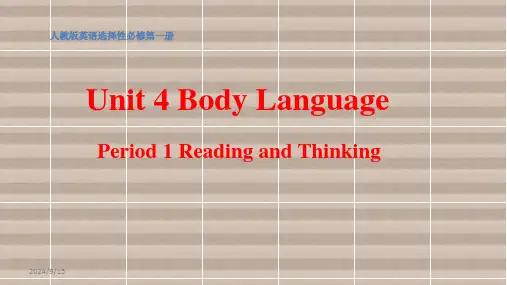
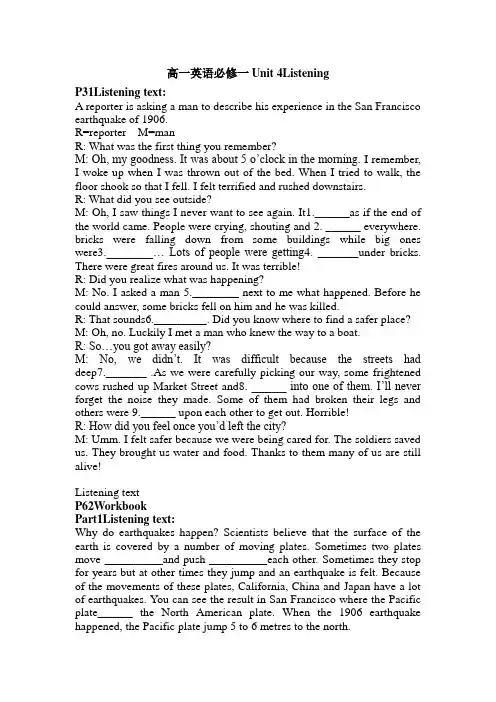
高一英语必修一Unit 4ListeningP31Listening text:A reporter is asking a man to describe his experience in the San Francisco earthquake of 1906.R=reporter M=manR: What was the first thing you remember?M: Oh, my goodness. It was about 5 o’clock in the morning. I remember, I woke up when I was thrown out of the bed. When I tried to walk, the floor shook so that I fell. I felt terrified and rushed downstairs.R: What did you see outside?M: Oh, I saw things I never want to see again. It1.______as if the end of the world came. People were crying, shouting and 2. ______ everywhere. bricks were falling down from some buildings while big ones were3.________… Lots of people were getting4. _______under bricks. There were great fires around us. It was terrible!R: Did you realize what was happening?M: No. I asked a man 5.________ next to me what happened. Before he could answer, some bricks fell on him and he was killed.R: That sounds6._________. Did you know where to find a safer place? M: Oh, no. Luckily I met a man who knew the way to a boat.R: So…you got away easily?M: No, we didn’t. It was difficult because the streets had deep7._______ .As we were carefully picking our way, some frightened cows rushed up Market Street and8. ______ into one of them. I’ll never forget the noise they made. Some of them had broken their legs and others were 9.______ upon each other to get out. Horrible!R: How did you feel once you’d left the city?M: Umm. I felt safer because we were being cared for. The soldiers saved us. They brought us water and food. Thanks to them many of us are still alive!Listening textP62WorkbookPart1Listening text:Why do earthquakes happen? Scientists believe that the surface of the earth is covered by a number of moving plates. Sometimes two plates move __________and push __________each other. Sometimes they stop for years but at other times they jump and an earthquake is felt. Because of the movements of these plates, California, China and Japan have a lot of earthquakes. You can see the result in San Francisco where the Pacific plate______ the North American plate. When the 1906 earthquake happened, the Pacific plate jump 5 to 6 metres to the north.Part2Listening text:China is a country 1.________ many earthquakes happen. The Pacific plate is pushing China from the east and the Indian plate is pushing China from the southwest. The power of this movement created the Himalayas and Mount Qomolongma. It now causes earthquake in China. We cannot stop earthquakes but we can do things to make sure they do not2. _______whole cities. First it is not a good idea to build houses along the line where two plates meet. Second, if you think there may be an earthquake, make sure to build houses on rock 3.______ _______sand. Third, you must make the houses as strong as possible. Weak buildings will fall down in an earthquake, but strong ones may5._____ ______.。
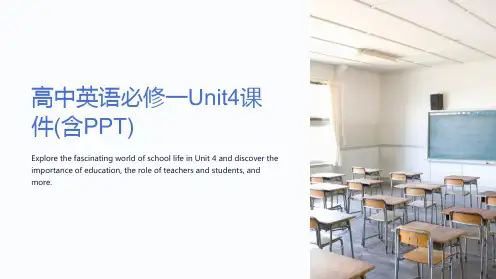
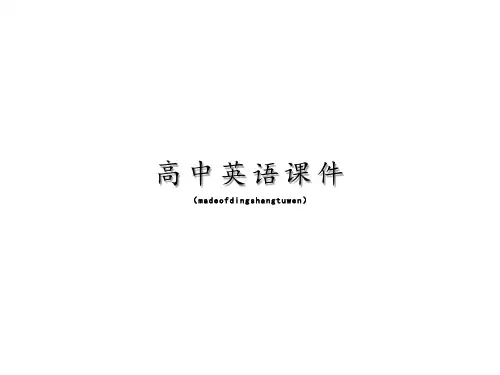

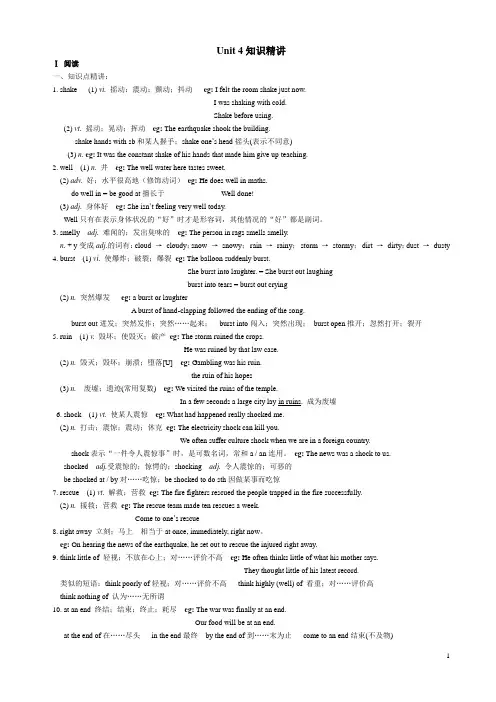
Unit 4知识精讲Ⅰ阅读一、知识点精讲:1. shake (1) vi.摇动;震动;颤动;抖动eg: I felt the room shake just now.I was shaking with cold.Shake before using.(2) vt. 摇动;晃动;挥动eg: The earthquake shook the building.shake hands with sb和某人握手;shake one’s head摇头(表示不同意)(3) n. eg: It was the constant shake of his hands that made him give up teaching.2. well (1) n.井eg: The well water here tastes sweet.(2) adv.好;水平很高地(修饰动词)eg: He does well in maths.do well in = be good at擅长于Well done!(3) adj.身体好eg: She isn’t feeling very well today.Well只有在表示身体状况的“好”时才是形容词,其他情况的“好”都是副词。
3. smelly adj.难闻的;发出臭味的eg: The person in rags smells smelly.n. + y变成adj.的词有:cloud→cloudy;snow →snowy;rain →rainy;storm →stormy;dirt →dirty;dust →dusty 4. burst (1) vi. 使爆炸;破裂;爆裂eg: The balloon suddenly burst.She burst into laughter. = She burst out laughingburst into tears = burst out crying(2) n.突然爆发eg: a burst or laughterA burst of hand-clapping followed the ending of the song.burst out迸发;突然发作;突然……起来;burst into闯入;突然出现;burst open推开;忽然打开;裂开5. ruin (1) v.毁坏;使毁灭;破产eg: The storm ruined the crops.He was ruined by that law case.(2) n.毁灭;毁坏;崩溃;堕落[U] eg: Gambling was his ruin.the ruin of his hopes(3) n.废墟;遗迹(常用复数) eg: We visited the ruins of the temple.In a few seconds a large city lay in ruins. 成为废墟6. shock (1) vt.使某人震惊eg: What had happened really shocked me.(2) n.打击;震惊;震动;休克eg: The electricity shock can kill you.We often suffer culture shock when we are in a foreign country.shock表示“一件令人震惊事”时,是可数名词,常和a / an连用。
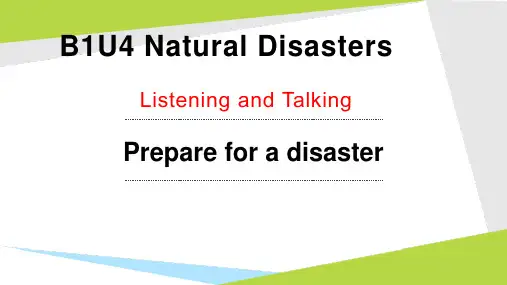
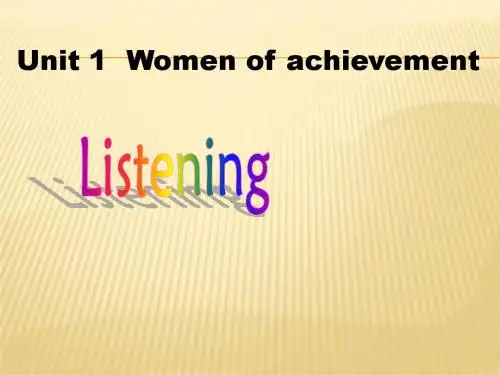
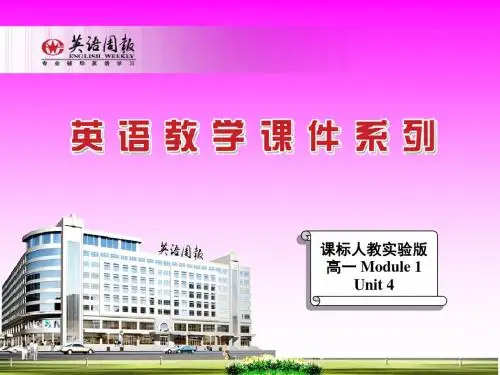

Teaching plan for unit 4Teaching aims and demands:1. Topic:Basic knowledge of earthquakes; how to protect oneself and help the others in disasters2. Useful words and expressions:earthquake, quake, right away, well (n.) , million , event , pipe, burst, as if, at an end , nation , canal, steam, dirt, ruin, in ruins , suffering, extreme, injure, destroy, brick, dam, track, useless, steel, shock, rescue, trap, electricity, disaster, dig out, bury, mine, miner, shelter, a (great ) number of , title, reporter, bar, damage, frighten, frightened, frightening, congratulation, judge, sincerely, express, outline, headline, cyclist3. Functions:Talking about past experiences:I will never forget the day when the earthquake took place. The time was 5:15 in the afternoon and I was driving along the road.Sequence4. Grammar:The attributive clause (I)由that, which, who, whose引导的定语从句The number of people who were killed or injured reached more than 400,000.It was heard in Beijing which is one hundred kilometers away.Workers built shelters for survivors whose homes had been destroyed.Teaching procedures:Period 1.Step 1. Warming upSs discuss and answer some questions:1. Which of the following may cause people the greatest damage?A. earthquakeB. typhoonC. floodD. drought2.Imagine your home begins to shake and you must leave it right away. You have time to take only one thing. What will you take? Why?Step 2. Pre-readingSs discuss and answer:1.Do you know what would happen before an earthquake?2.What can we do to keep ourselves safe from an earthquake?3. Do you know anything about Tangshan Earthquake in 1976?Step 3. Reading1.Skimming and find the answers to the following questions:a.What happened?b.When and where did it happen?3.Ss read the whole passage again and get the main ideas of each part:Part 1. The natural signs of a coming earthquakePart 2-3. The damage of the city after the earthquakePart 4. The help to the survivorsStep 4. ComprehendingSs finish Ex 1 and 2 on page 27.Step 5. Assignment1.Surf the internet and get more information about the earthquake.2.Retell the text.Period 2.Step 1. Warming up1.Ss share more information about the earthquake.2.Ask some Ss to retell the text by using their own words.Step 2. Language points1.lie –lay-lain (v.) : to be, remain or be kept in a certain state 处于某种状态The village lay in ruins after the war.These machines have lain idle since the factory closed.2.in ruins: severely damaged or destroyed 毁坏an earthquake left the whole town in ruins.His career is in ruins.3.number (n.): a quantity of people or things 数目;数量The number of people applying has increased this year.We were fifteen in number.a number of: a lot ofI have a number of letters to write.A large number of people have applied.4. injure (v.): to hurt oneself/sb./ sth. physically 受伤He fell off the bicycle and injured his arm.5. reach (v.): to achieve or obtain sth. 达成;达到;获得You’ll understand it when you reach my age.At last we reached a decision.6. rescue (n.): an act of rescuing or being rescued 搭救;解救A rescue team is trying to reach the trapped mines.Rescue (v.): to save or set free from harm, in danger, or loss 解救;救出The rescued the man from drowning.7. trap(v.): in a place from which one wants to escape but cannot 困住;陷于绝境They were trapped in the burning hotel.8. all …not… = not all…: some but not all 一些;但不是全部Not all the girls left.=Only some of them left early.Not all the children are noisy.=Some of the children are not noisy.全部否定应用: none of…None of us were allowed to go there.None of these reports is very helpful.Step 3. learning about language1. Ss finish Ex 1,2 and 3 on page 27 and 28.2. Teacher checks the answer and give the Ss some help if they have some difficulty. Step 4. assignment1.Finish Wb.Ex.1 on page 63.2.Ss try to remember the useful words and expressions by hearts.Period 3Step 1. Warming upSs read the passage again and try to find the sentences with attributive clauses.e.g. Workers built shelters for survivors whose homes had been destroyed.Step 2. Attributive clause1.Give Ss more sentences and let the Ss to find the structures of the attributiveclause.2.Ss do some exercises about how to use that, which, who or whose.3.Ss finish Ex 2 on page 28.Some materials about attributive clause:关系代词引导的定语从句关系代词所代替的先行词是人或物的名词或代词,并在句中充当主语、宾语、定语等成分。
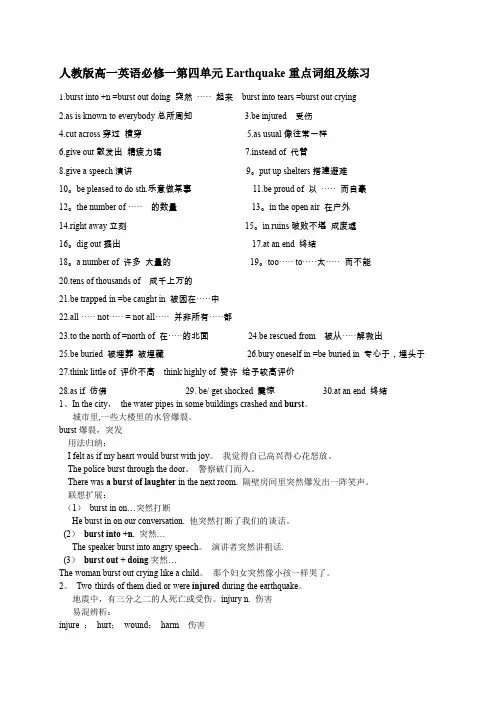
人教版高中英语必修一第一单元听力练习In this section, you will listen to five short conversations and answer some questions. Each conversation will be played twice. Please listen carefully.1. Conversation 1Speaker A: Excuse me, is this the right way to the supermarket?Speaker B: No, I'm afraid you are going in the wrong direction. The supermarket is two blocks that way.Speaker A: Thank you.Question: Where is the supermarket?2. Conversation 2Speaker A: What do you think of the movie we watched last night?Speaker B: I thought it was quite boring. The storyline was weak, and the acting was not convincing.Speaker A: Really? I actually enjoyed it.Question: How did Speaker A feel about the movie?3. Conversation 3Speaker A: Can I borrow your black pen, please?Speaker B: Sorry, I don't have it with me today. You can borrow it from Jack. He always has one.Speaker A: Okay, thanks.Question: Where can Speaker A borrow a black pen?4. Conversation 4Speaker A: What are your plans for the weekend?Speaker B: I'm thinking of going hiking in the mountains. Do you want to join me?Speaker A: That sounds like a great idea, but I have to work on a school project.Question: Why can't Speaker A join Speaker B for hiking?5. Conversation 5Speaker A: Do you know when the next bus to the city center arrives?Speaker B: According to the schedule, it should be here in about ten minutes. But sometimes, it might be a bit late.Question: How long does Speaker B say it will take for the next bus to arrive?In this section, you will listen to a passage and answer some questions. The passage will be played twice. Please listen carefully.Directions: Listen to the passage and answer the following questions.The Benefits of Regular ExerciseRegular exercise has many health benefits. First of all, it helps to strengthen our muscles and bones. It also improves our cardiovascularhealth, which means it makes our hearts and lungs stronger. In addition, exercise helps us maintain a healthy weight and reduces the risk of developing chronic diseases such as obesity and diabetes.Question 1: What are the benefits of regular exercise mentioned in the passage?Question 2: What health condition can regular exercise help reduce the risk of developing?Section 3: DictationIn this section, you will listen to a sentence and write it down. The sentence will be played twice. Please listen carefully and write it down.Sentence: I will meet you at the coffee shop on Main Street at 3 p.m.。
新教材高中英语新人教版选择性必修第一册:UNIT 4 Section Ⅰ一、语言基础训练Ⅰ.单词拼写1.He is in deep sorrow, so it isn't an appropriate (合适的) time to mention this subject.2. Witnesses (目击者) in the area reported seeing the traffic accident when they were in the street.3.She can not speak English so her children have to interpret (口译) for her.4.Transportation and communication networks bring people together. Yet sometimes people themselves create barriers (障碍) to transportation and communication.5.The two pictures are similar, although not identical (相同的).6.She finished what she had to say with a gesture (姿势) of despair.7.Your time could be usefully employed (使用) in attending to professional matters.8.His sudden departure had demonstrated (说明) how unreliable he was.9.His expressions varied (变化) from pokerfaced to blank.10.Later on I remember that I forgot to bow (鞠躬) at that time.Ⅱ.完成句子1.My mother didn't approve of my giving up the current job.我妈妈不同意我放弃目前的工作。